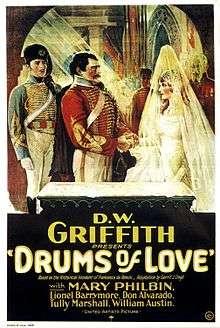Drums of Love
Drums of Love (1928) is a silent romance film directed by D. W. Griffith.
| Drums of Love | |
|---|---|
 theatrical poster | |
| Directed by | D. W. Griffith |
| Produced by | D. W. Griffith |
| Written by | Gerrit J. Lloyd |
| Starring | Mary Philbin Lionel Barrymore |
| Music by | Charles Wakefield Cadman Sol Cohen |
| Cinematography | G. W. Bitzer Karl Struss Harry Jackson |
| Edited by | James Smith |
| Distributed by | United Artists |
Release date |
|
Running time | 100 minutes |
| Country | United States |
| Language | Silent English intertitles |
Plot
After finding out her father and his estate is in danger, Princess Emanuella saves his life by marrying Duke Cathos de Alvia, a grotesque hunchback. She actually is in love with Leonardo, his attractive younger brother. They already had an affair before the marriage, but continue secretly meeting each other. In the end, Cathos finds out about his wife's unfaithfulness and stabs both his wife and brother to death.[1]
Cast
- Mary Philbin as Princess Emanuella
- Lionel Barrymore as Duke Cathos de Alvia
- Don Alvarado as Count Leonardo de Alvia
- Tully Marshall as Bopi
- William Austin as Raymond of Boston
- Eugenie Besserer as Duchess de Alvia
- Charles Hill Mailes Duke de Granada
- Rosemary Cooper as The Maid
- Joyce Coad as The Little Sister
Production
The film was a modernized adaption of a Francesca da Rimini opera. The settings were changed from 14th century Italy to 19th century South America.[2] The film was directed by D. W. Griffith, whose career was in decline.[2] He imposed a happy ending, but this idea was rejected.[2]
The female lead went to Mary Philbin, who was on a loan from another studio, (Universal). Cinematographer Karl Struss was especially impressed with the actress and tested her two weeks for different wigs.[3] Philbin later called working with Griffith like a 'dream come true'.[4]
Reception
The film was received as one of D. W. Griffith's weakest.[2] Critics agreed that Griffith did not know how to handle the film's theme and story the way Tod Browning could have.[5] Both the critics and the audience agreed that the poor reception was mainly due to the ending.[6]
See also
- D. W. Griffith filmography
- Lionel Barrymore filmography
References
- "Drums of Love (1928): (Synopsis)". Turner Classic Movies. Retrieved 2017-02-03.
- Hall, Mordaunt. "Review Summary". The New York Times. Retrieved 2010-01-15.
- Slide, A., Silent players. p.307
- Beck, C., Scream queens: heroines of the horrors. p.70
- Norden, M., The cinema of isolation: a history of physical disability in the movies. p.103
- Norden, M., The cinema of isolation: a history of physical disability in the movies. p.104